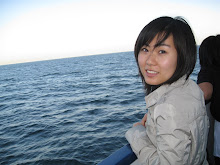Today, the long awaited APOC program finally started! When I arrived at the class building at
In our first lecture, we were very lucky to catch Dr. Cole before he left the country. He depicted for us a vibrant picture about traditional media and digital media, and their interactions through a historical perspective. He also passionately shared with us the trends he observed about digital media through tracking the evolution of digital media in the past ten years. He mentioned the consolidation of the newspaper industry and the shrinking of the numbers of newspapers due to the declining spending from advertisers. Dr. Cole also mentioned how media brands are going to be more and more important in the future media world because when people face so many media consumption choices, the trust carried by brand names will be proven to be even more valuable.
Since I entered journalism school in 2004, I have been hearing similar predictions about the fate of newspaper industry and I personally have no doubts about it. But I feel as the overall global audience is more and more attracted to fewer and fewer one-stop sources for news media like the New York Times, and as sources where people get their news become more and more concentrated, there is going to much less variety in news; I wonder how should we prevent these powerful news sources from becoming monopolies that may abuse their influence? Can we still count on them as being the watchdog for our society? Even though social media may have brought a high degree of democracy to the average netizen, and there are more and more citizen-journalist reports online through blogs or other means, they are mostly "parasite-ing" first-hand news reported from professional news agencies. In some cases, citizen journalists will get a piece of the information about the event from the surface, but they usually do not have the resource or energy to spend on producing systematic and investigative news content. So as the journalism as a profession keeps losing their grounds? Who will take their place to be the content provider? Will these genres of content, quality content disappear forever? Will the long tail rules apply to the news content in the digital age? Unfortunately I can not articulate myself well enough in the presence of so many questions, but I eagerly anticipate exploring these issues in further depth in the future..
(Updates: I finally found an outlet for these questions in tonight's Social Dynamics of Communication Technologies class taught by professor Dmitri Williams, a very interesting video shared by Professor Williams has spurred a lively discussion from the APOC group, and many hypothesis were raised and I tend to agree with the one that there should be room in the future for the co-existence of professional journalism and citizen journalism, and professional journalism should find their fundings through other resource besides advertisement. Hopefully this will happen, we will see.)
After class, I wandered a little bit around the area where we had class, and guess what I found? An exclusive Kung-Fu studio in the black ally one block away from the lecturing building:





No comments:
Post a Comment